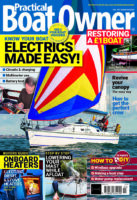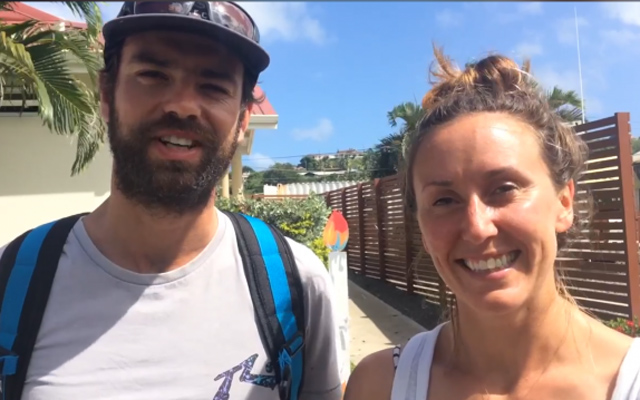After three years of planning, the Pollard family made it to the start of the ARC+ only to sustain damage to their mast
“It could have been much worse,” says New Zealander Simon Pollard, pointing to the coachroof of the Oyster 56, which looks strangely bare without its mast. “It could have come down when we were sailing.”
The family of six were making their way to the start of the ARC+ in Gran Canaria when a huge gust hit them in the Strait of Gibraltar. The wind blasted down the hillside causing their boat, Dragonfly, to gybe, snapping the preventer. Simon’s wife Amandine was on deck with their four children, aged 4, 10, 12 and 13.

Simon on the boom (before the gybe). Image from family blog
“Simon went down below, I was in the cockpit and we’d just been sailing on the same angle for ages and ages,” she says. “Suddenly there was a wind shift and a loud noise. It just happened so quickly. It’s frightening when you realise how violent the movement is.”
Cracked mast
There was no obvious damage at first, but then Simon noticed a crack on the mast near the gooseneck. He made a mark around it and checked it every hour, in between speaking to the rigger and Oyster Yachts.
Article continues below…
Planning your next adventure? Here’s some inspiration from the crews of ARC 2019
Have you ever crossed the Atlantic? This month at PBO we’re focusing on Amazing Adventures. If you’re planning a passage,…
Overboard in the Atlantic – how I fixed a broken rudder
When my wife Teija told me she had a surprise for me one Christmas, little did I know how valuable…
After spending a few days recovering in Lanzarote they motored across to Gran Canaria, where they hoped to able to fix the mast.
“We thought we’d just need a local repair, but when the yard started sanding back they saw a much larger crack,” says Amandine. “We’re going to need a whole new mast!”
Having sold their house and all their possessions to sail around the world, the couple are understandably daunted by the prospect of funding a new mast. The insurance will hopefully cover 70% of it, but they’ll have to pay the remainder themselves.

Simon and kids enjoying having visitors onboard Dragonfly. Photo from family blog
“We’re a year into owning the boat, but half of that time has been spent refitting her,” says Simon. “We just want to go sailing! We’ve all watched Sailing La Vagabond and SV Delos – and the highs are actually amazing but the lows, the stresses of not having an income when things break… you sit there thinking about how much it costs, and how long the budget will last.”
Hoping to make the ARC
Nonetheless, the couple remain optimistic they’ll make the start of the ARC on 21 November, which sails straight to St Lucia without a stopover. The ARC+ – which they were originally planning to do – stops in Cape Verde and finishes in Grenada.
“Once we’re away we’ll anchor as much as possible,” says Simon. “We don’t stay in marinas. We’ve got solar panels and can eat quite cheaply – we’ve got diving spear guns and will fish off the boat. How long we stay depends on the budget.
“We’d like to do the Caribbean twice and the Pacific twice and finish in New Zealand, depending on Covid and how the borders open up.”
Before they started a family, Simon and Amandine used to work on charter yachts together, Simon as a skipper and Amandine as a chef, and they’re not averse to the idea of doing that again.
“It’s really exciting – but at the moment we’re realising we’ve dug way too deep into the budget already and will have to find a way to replenish the bank account,” says Simon. “Who knows, we could get Dragonfly kitted out and charter her out on week-long trips.”

Amandine and Simon onboard their (mastless) boat Dragonfly
Find out how Simon, Amandine and family are getting on in their blog sailingdragonfly.wordpress.com and look out for more of their adventures – and those of other ARC participants – in the February edition of PBO.
You can find out more about the Atlantic Rally for Cruising (ARC) on the World Cruising Club site, and more about the island where the ARC participants are gathering, at www.grancanaria.com.





